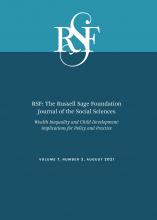Research Article
Open Access
Exposure to the Earned Income Tax Credit in Early Childhood and Family Wealth
Katherine Michelmore, Leonard M. Lopoo
RSF: The Russell Sage Foundation Journal of the Social Sciences August 2021, 7 (3) 196-215; DOI: https://doi.org/10.7758/RSF.2021.7.3.09
Katherine Michelmore
aAssistant professor of public administration at the Maxwell School, Syracuse University, United States
Leonard M. Lopoo
bMaxwell Advisory Board Professor of Public Policy at the Maxwell School, Syracuse University, United States

REFERENCES
- ↵
- Addo, Fenaba R
- ↵
- Baker, Ross, and
- Constantine Yannelis
- ↵
- Bastian, Jacob
- ↵
- Bastian, Jacob, and
- Katherine Michelmore
- ↵
- Berger, Lawrence M.,
- Sarah A. Font,
- Kristen Shook Slack, and
- Jane Waldfogel
- ↵
- Bitler, Marianne,
- Hilary Hoynes, and
- Elira Kuka
- ↵
- ↵
- Dahl, Gordon B., and
- Lance Lochner
- ↵
- Dahl, Molly,
- Thomas DeLeire, and
- Jonathan Schwabish
- ↵
- Dynarski, Susan, and
- Jonathan Gruber
- ↵
- Eissa, Nada, and
- Jeffrey B. Liebman
- ↵
- ↵
- Goodman-Bacon, Andrew, and
- Leslie McGranahan
- ↵
- Halpern-Meekin, Sarah,
- Kathryn Edin,
- Laura Tach, and
- Jennifer Sykes
- ↵
- ↵
- Hoynes, Hilary W., and
- Ankur J. Patel
- ↵
- Internal Revenue Service (IRS)
- ↵
- Jones, Lauren E., and
- Katherine Michelmore
- ↵
- Jones, Lauren E., and
- Katherine Michelmore
- ↵
- Leiserson, Greg,
- Will McGrew, and
- Raksha Kopparam
- ↵
- Lovenheim, Michael F
- ↵
- Manoli, Day, and
- Nicholas Turner
- ↵
- Meyer, Bruce D., and
- Dan T. Rosenbaum
- ↵
- Michelmore, Katherine, and
- Leonard M. Lopoo
- ↵
- ↵
- Pfeffer, Fabian T.,
- Robert F. Shoeni,
- Arthur Kennickell, and
- Patricia Andreski
- ↵
- ↵
- Romich, Jennifer, and
- Thomas Weisner
- ↵
- ↵
- Shaefer, H. Luke,
- Xiaoqing Song, and
- Trina R. Shanks
- ↵
- Smeeding, Timothy M.,
- Katherin Ross Phillips, and
- Michael O'Connor
- ↵
- ↵
- Weber, Caroline
- ↵
- ↵
- Wolff, Edward N
In this issue
Exposure to the Earned Income Tax Credit in Early Childhood and Family Wealth
Katherine Michelmore, Leonard M. Lopoo
RSF: The Russell Sage Foundation Journal of the Social Sciences Aug 2021, 7 (3) 196-215; DOI: 10.7758/RSF.2021.7.3.09
Jump to section
Related Articles
- No related articles found.
Cited By...
- No citing articles found.





